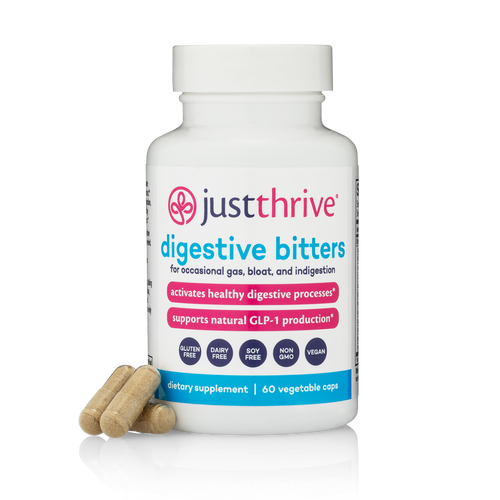Use this 3-part plan to deal with SIBO once and for all.
You’ve been worn down by diarrhea or constipation… plagued by painful gas and bloating… and it looks like there’s a volleyball in your stomach by the end of the day.
And you think you have SIBO (small intestinal bacterial overgrowth), but you don’t know what to do about that.
If you’ve been to the doctor—and many people don’t bother—they may not have been much help. SIBO is frustratingly under-diagnosed and often misdiagnosed.[1]
Many people struggle with SIBO for years before getting a correct diagnosis, followed by a long course of antibiotics. Unfortunately, those don’t always work. And they can lead to even more gastrointestinal (GI) problems and other awful side effects.
Here’s the truth… silencing SIBO can be tough. But by following this 3-part plan, you can get it under control, and keep it from coming back.
What Exactly Is SIBO?
Small intestinal bacterial overgrowth is just what you’d think: too many bacteria in the small intestine, especially bacteria that aren’t supposed to be there at all.[2] SIBO happens when the small intestine’s local bacteria start growing and multiplying out of control, or when bacteria from the large intestine go where they don’t belong and start to colonize.
Whichever cause kicked it off, it leads to a chain reaction that leaves you feeling awful. The extra unwanted bacteria feed on the undigested food—especially sugars and starches—in the small intestine and convert it into hydrogen gas. Then other bacteria consume that hydrogen and turn it into methane gas.
Now your small intestine is full of hydrogen and methane, fueling painful gas attacks and uncomfortable bloating along with other issues such as:[3]
- diarrhea
- constipation
- cramping
- abdominal pain
- foul-smelling stool
- nutrient deficiencies
- fatigue
- lactose intolerance and gluten intolerance
- weakness
Unfortunately, these issues can point to many other conditions including IBS (irritable bowel syndrome). So it’s not surprising that SIBO often gets misdiagnosed.[4] And even when it is diagnosed correctly, the standard solution—antibiotics—doesn’t always work. SIBO comes back in at least 45% of patients treated with antibiotics.[5]
Luckily, there are steps you can take to show SIBO the door so you can get your small intestine back on track.

Your 3-Part Plan to Fight SIBO
Step 1: Starve the bacteria out.
Bacteria need to eat, and the ones involved in SIBO prefer sugar and starchy carbs. So removing those foods from your diet completely will starve those bacteria.[6][7] When they don’t eat, they can’t grow and multiply. This step can be very hard to stick with, but it’s a must for SIBO recovery… and it’s temporary.
Step 2: Kill off the bad bacteria.
To gain the edge over SIBO, you need to kill off all the bacteria that don’t belong in your small intestine. And while the standard go-to here is strong antibiotics, those may not solve the problem long-term; there’s a high risk of recurrence.[8] Plus, those drugs kill all bacteria, including the good bacteria you DO want in your intestines that are crucial for your health.
So what can you do? Try natural options like berberine and grapefruit seed extract. They’re tough on pathogens but gentler on beneficial bacteria.[9][10] And they can also be much easier on your digestive system overall.
But the biggest thing you can do is take a spore-based probiotic regularly, which leads us to step 3…
Step 3: Recondition your gut with probiotics.
Without a healthy gut microbiome—the trillions of bacteria in your large intestine (your gut)—you’ll be more vulnerable to SIBO moving forward. So it’s important to keep your gut microbiome balanced, meaning beneficial bacteria vastly outnumber pathogenic bacteria. And the best way to do that is with probiotics.[11]
But this step comes with a strong warning: Make sure to do your research and choose the right probiotic supplement. Many probiotics can actually fuel the SIBO situation and make things worse, canceling out all the hard work you’ve done in the first two steps. So be careful about which probiotics you choose. A probiotic containing spore-based strains is optimal.

Finding the Right Probiotics… and Avoiding the Wrong Ones
Probiotics won’t cause SIBO, but some may make it worse.
Most probiotic supplements that you’ll see on store shelves include bifidobacterium and lactobacillus probiotics, bacteria families often overgrown in cases of SIBO. When you take these probiotics, they join the crowd in your small intestine, adding to the excess bacteria that are already there. That can make the situation and how you’re feeling worse.
That’s why you’ll want to focus on spore probiotics. These strains have a natural protective shell that helps them survive harsh environments and extreme temperatures. This means they can easily pass through stomach acid and enzymes along your digestive tract to make it all the way to your gut—your large intestine—alive and intact.
When they reach your gut, spore probiotics shed their shells and spring into action. They quickly get to work crowding out bad bacteria and promoting a wide variety of beneficial bacteria to help create and maintain healthy balance in the gut microbiome.
Spore probiotics are the right probiotics to support a healthy gut without fueling SIBO. They help optimize bacterial populations while guarding against overgrowth. Exactly what you want right now.
Maintain a Healthy, Balanced Gut With Just Thrive
You’ll enjoy comfortable digestion and superior digestive health when your gut microbiome is in healthy balance, thanks to the power of spore probiotics. Just Thrive Probiotic & Antioxidant contains the most clinically studied combination of spore probiotics that are guaranteed to arrive 100% alive in the gut including:
- Bacillus indicus HU36™
- Bacillus subtilis HU58™
- Bacillus coagulans (SC-208)
- Bacillus clausii (SC-109)
Just Thrive Probiotic & Antioxidant helps you maintain a well-balanced gut and supports a flourishing population of diverse beneficial probiotic bacteria that’s happy right where it is.
>> Add Just Thrive Probiotic & Antioxidant to your daily routine today for total gut comfort.
Not sure about trying Just Thrive? We can help with that.
EVERY Just Thrive purchase is covered by our Bottom of the Bottle, 100% money back guarantee.
That means you can try Just Thrive Probiotic & Antioxidant to see if it works well for you… and we’re betting it will.
But if for any reason you don’t feel a difference, you can ask for a full refund at any time. Even if it’s 3 months or 3 years later. And even if the bottle is empty! You’ll get your money back any time, no matter what.
Sources
- Bures J, Cyrany J, Kohoutova D, Förstl M, Rejchrt S, Kvetina J, Vorisek V, Kopacova M. Small intestinal bacterial overgrowth syndrome. World J Gastroenterol. 2010;16(24):2978-2990.
- Sachdev AH, Pimentel M. Gastrointestinal bacterial overgrowth: pathogenesis and clinical significance. Ther Adv Chronic Dis. 2013 Sep;4(5):223-31.
- Achufusi TGO, Sharma A, Zamora EA, Manocha D. Small Intestinal Bacterial Overgrowth: Comprehensive Review of Diagnosis, Prevention, and Treatment Methods. Cureus. 2020 Jun 27;12(6):e8860.
- Poon D, Law GR, Major G, Andreyev HJN. A systematic review and meta-analysis on the prevalence of non-malignant, organic gastrointestinal disorders misdiagnosed as irritable bowel syndrome. Sci Rep. 2022 Feb 4;12(1):1949.
- Sorathia SJ, Chippa V, Rivas JM. Small Intestinal Bacterial Overgrowth. In: StatPearls. Treasure Island (FL): StatPearls Publishing; April 17, 2023.
- Saffouri GB, et al. Small intestinal microbial dysbiosis underlies symptoms associated with functional gastrointestinal disorders. Nat Commun. 2019 May 1;10(1):2012.
- Achufusi TGO, Sharma A, Zamora EA, Manocha D. Small Intestinal Bacterial Overgrowth: Comprehensive Review of Diagnosis, Prevention, and Treatment Methods. Cureus. 2020 Jun 27;12(6):e8860.
- Nickles MA, Hasan A, Shakhbazova A, Wright S, Chambers CJ, Sivamani RK. Alternative Treatment Approaches to Small Intestinal Bacterial Overgrowth: A Systematic Review. J Altern Complement Med. 2021 Feb;27(2):108-119.
- Han HW, Kwak JH, Jang TS, Knowles JC, Kim HW, Lee HH, Lee JH. Grapefruit Seed Extract as a Natural Derived Antibacterial Substance against Multidrug-Resistant Bacteria. Antibiotics (Basel). 2021 Jan 18;10(1):85. doi: 10.3390/antibiotics10010085. PMID: 33477436; PMCID: PMC7830962.
- Wu S, Yang K, Hong Y, Gong Y, Ni J, Yang N, Ding W. A New Perspective on the Antimicrobial Mechanism of Berberine Hydrochloride Against Staphylococcus aureus Revealed by Untargeted Metabolomic Studies. Front Microbiol. 2022 Jul 13;13:917414.
- Khalighi AR, Khalighi MR, Behdani R, Jamali J, Khosravi A, Kouhestani Sh, Radmanesh H, Esmaeelzadeh S, Khalighi N. Evaluating the efficacy of probiotic on treatment in patients with small intestinal bacterial overgrowth (SIBO)--a pilot study. Indian J Med Res. 2014 Nov;140(5):604-8. PMID: 25579140; PMCID: PMC4311312.














